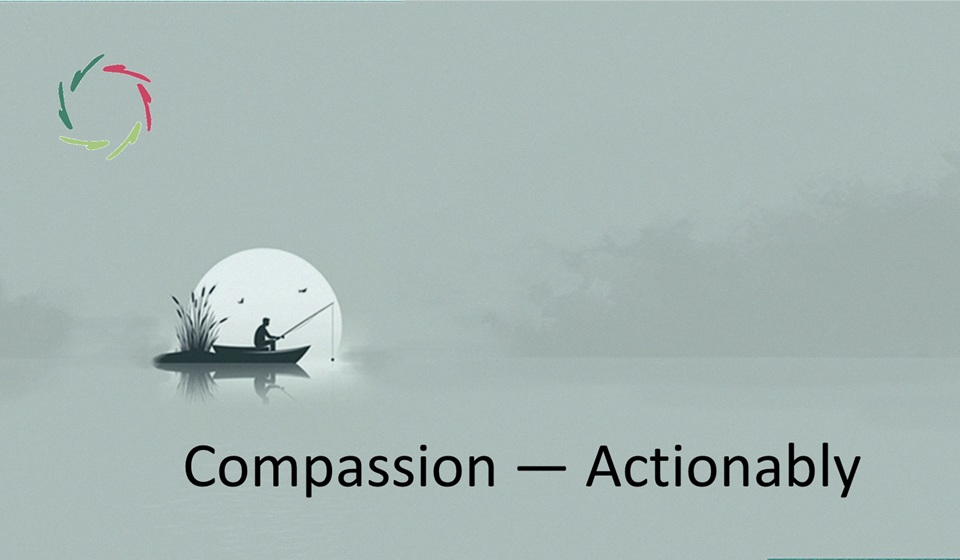Sustainability through Compassion

In order to be more than a buzzword, sustainability needs to be more than itself. Without Compassion, there may not even be sustainable sustainability.
Please read [see: “Essence of Compassion“] to get a feel of appropriate un-easiness. That is always a good start towards Compassion.
Abstractly
Compassion is the connection between people in total-person. Making this connection efficient is necessary for any form of serious sustainability. Within a – preferentially global – Compassion culture, less stuff is needed to let life be worthwhile for all. [see: “Sustainable Growth = Inner Growth“]
This doesn’t mean less stuff, only less needed stuff. Stuff that pollutes… nobody needs. We don’t even require to become monks for this, only Compassionate human beings. There can still be much growth, also for companies. [see: “The Growth Company – People, Planet, Profit“]
We can all together strive towards a positive GCP, a ‘Global Compassionate Product.’ Every action that heightens this makes the planet more sustainable. In contrast to this, the more indirection we need to attain some happiness, the more people get hooked on what gives them an impression of depth, and the more they need (in products and services) to attain it, while the planet suffers.
Compassion is oriented towards attaining end-values [see: “Being of Value“]. People may call this attainment ‘happiness.’ Note that end-values are concrete only to a slight degree.
This may all look like an abstract mumble-jumble. One might get tired of the notion of Compassion this way. In reality, direct consequences are everywhere.
Concretely
As to health/healthcare (medicine, psychology), you find this at [see: “Sustainable Healthcare through Compassion“].
As to leadership, the really sustainable kind is infused with Compassion. [see: “Sustainable Leadership“]
As to the judiciary, seeing what drives a criminal to criminal acts opens up ways to align him towards his end-values in less criminal ways. Of course, getting a bunch of easy money is not an end-value. Guilt may be replaced by much more efficient responsibility. [see: “Always Responsible, Never Guilty“]
As to education, Compassion shows each parent and educator that children are not motivated from outside. Nobody is. [see: “There are inner motivations.“]
As to diplomacy, this can be made much more efficient with parties at least being able to listen to each other deeply. [see: “Deep Diplomacy“]
As to religion, people can be united in an Open Religious endeavor instead of bunkering down in conceptual beliefs, each one against all others. [see: “Religion and Compassion“]
And so on.
Globally and historically
I don’t know if any culture lacks Compassion as a central tenet. All people on this planet can find each other in it. This brings the possibility to join everyone in the same endeavor. In my opinion, a lovely thought with possible repercussions in healthcare, business, and much more.
It is also the most sustainable way to manage our species, in totality and for always. Interesting? Compassion can help in that. Compassion does that. Transcending place and time in caring is all about Compassion.
Strings and more
I see a bunch of strings, each attached to the others at one point. Tearing this point to a future of Compassion brings all the different strings closer together in a very natural, spontaneous way, also the ones that start in very different directions. You don’t need to bring them together explicitly. It happens as by itself, as a special gift, gracefully. A leader who works on this appears charismatic.
Of course, at the same time, the nonconceptual aspect of Compassion is also a challenge to many. It is a hurdle that, when taken, acts like a ritual, a passage towards eventual unity. This Compassionate challenge may even be what every ritual passage is about: the transcendence of mere-ego towards acknowledging oneself as a broader person. An orientation to others is helpful to make this happen. [see: “The Good Ritual“]
Compassion is necessary for sustainability in the broadest sense.
Choosing for the one is choosing for the other.
Eventually, there is no other choice.


